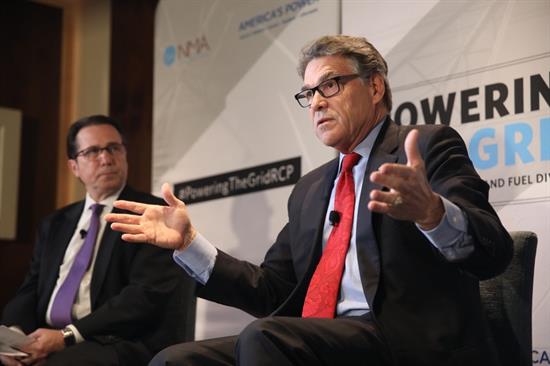In the News
Perry Cites Energy, Emissions Gains, Defends Saudi Deal
Washington,
March 29, 2019
Addressing the policy debate surrounding America’s energy, environmental and economic future, Rick Perry on Friday declared the United States both a global leader in fossil fuels and an environmental superpower. But first the energy secretary had to explain why his agency granted six authorizations enabling private companies to sell nuclear power technology to Saudi Arabia, and why it did so in secret. The administration quietly pursued the deal with Saudi Arabia as that Middle Eastern power prepares to build two nuclear power plants, Reuters reported Wednesday. Senate lawmakers grilled Perry about the technology transfer Thursday, and he explained the rational further at an event – dubbed “Powering the Grid: Access, Affordability and Fuel Diversity” -- hosted by RealClearPolitics Friday morning in Washington. The action was legal, Perry said, and done in accordance with what is called a Part 810 Authorization. The export of unclassified civil nuclear technology was kept quiet, he continued, to assure industry that the federal government would protect their trade secrets: “We aren’t going to give your business plan or your business proprietary information to the public.” Though Saudi Arabia sits on vast oil reserves and has not yet agreed to anti-proliferation requirements, the kingdom has entertained bids for nuclear power from both South Korea and Russia. The United States, however, is expected to close the deal. This is just fine with Perry. It means money, and it means investment for future development, the 2012 presidential candidate insisted. “You betcha -- do I want the countries around the world that are going to build a civil nuclear [program] to be using American companies? Absolutely,” he said. One of those companies, Westinghouse, makes the best reactors in the world, Perry said. Even when constructed abroad, such projects strengthen the supply chain in the U.S. while investing in “the intellectual capital that comes with keeping a strong civil nuclear program in place.” He was also excited about nuclear development stateside. A week earlier, the DOE issued a $3.7 billion federally guaranteed loan to continue construction of the Vogtle nuclear power plant in Georgia. Those funds come on top of $8.3 billion in guarantees awarded by the Obama administration, and are part of the current administration’s larger overall effort to decrease carbon emissions through what Perry described as an “all-of-the-above strategy.” “It is pretty hard to argue that if you care about the climate, if you care about the environment, [and] this globe around it,” Perry said, “that you are against nuclear power, zero-emissions. That just doesn’t jive for me.” Environmentalists, including those who protested briefly outside the event before calling it quits, are skeptical of energy policy under Perry’s stewardship. His boss has relaxed Obama-era rules on auto emissions, ended the so-called “war on coal,” and pulled out of the Paris Climate Accords. But while this country has become the leading global exporter of oil under his watch, Perry maintains that this White House is also serious about emissions and committed to utilizing all sectors of energy production. “I hope no one gets confused that this administration is not for all of those forms of energy. We are. We are going to need it all,” he said. “When you think about the potential growth in Africa, when you look at India and China, the demand for energy is literally through the roof. We want it to be American innovation. We want it to be clean energy. And we can do that. But we can’t throttle this country, because we truly are leading the world.” The “foundational energy sources,” Perry said, will be nuclear and coal. And the former governor of the oil-rich state of Texas added that renewables are also a key part of the mix. He bragged that the solar industry has grown “by 90 percent in the last two years” and noted that the U.S. has cut emissions under the last three presidents by “14 percent.” That’s part of what Perry calls the “great story to tell,” and it is one he tried out while travelling abroad. European leaders lecture him in public, the secretary said, usually about leaving the Paris accords. In private, he said they ask how they can increase imports of liquefied natural gas. “The reason that liquefied natural gas is desired in Europe is not only because it will help lower emissions but it will also free them from the dependence on Russian gas,” Perry said. “I will suggest to you that the Europeans are pretty wise about having alternative sources of energy rather than the Russians. “If you don’t believe that,” he quipped, “go ask the Ukrainians.” Overall, the energy secretary is optimistic two years into the leading an agency he urged eliminating while a candidate for the Oval Office. He described the mission of the department as energy and security, and its results in terms of the economy and environment. And though Perry seems more environmentally conscious than before, he is no less bullish: “There is one country leading the charge. There is one country making a difference when it comes to the climate, and that’s America.” The RCP event, which was sponsored by the National Mining Association, also included panel discussions featuring, among others, Kentucky Gov. Matt Bevin, Reps. David B. McKinley and Larry Bucshon, and carbon management expert Charles D. McConnell. Philip WegmannReal Clear Politics |


